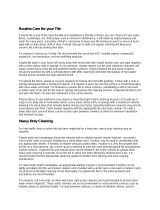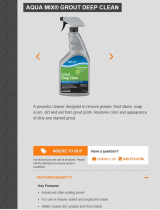CARE AND MAINTENANCE INSTRUCTIONS FOR CERAMIC, NATURAL STONE, AND GLASS TILE
Ceramic tile is a durable and low-maintenance surface for your walls, floors, and countertops.
It will retain its original beauty and luster for many years with proper maintenance. A
quick wipe with a clean damp cloth or mop helps prevent the buildup of food, soil, grease,
residue, soap, sealers, and liquids. Prompt cleanup will aid in keeping your ceramic tile
surfaces looking their best. Glass mosaics require low maintenance due to being impervious
to moisture and sub-surface staining.
StyleAccess recommends the use of low VOC (volatile organic compound), neutral pH, non-
hazardous, and non-polluting products if a stronger cleaning agent is required. Avoid
cleaning solutions containing ammonia, oils, fats, or acids. Follow all directions provided by
the cleaning product manufacturer for proper application, dilution, and usage. Acids can
damage the grout and the tile glaze, and ammonia can discolor the grout. The entire area
should be cleaned and scrubbed with clean water first, then a cleaning solution if
necessary. Apply through the use of a cotton mop, cloth, sponge, or gentle non-metallic
brush. A final rinse with clean water will remove cleaning solution residue. For glazed tile floors,
sweep or vacuum regularly to remove dirt, rocks, or other gritty particles. Follow with a mop
or sponge dampened with a neutral pH cleaner. Always be sure to rinse and thoroughly dry
the tile surface once cleaning is complete.
Tiled surfaces in your bathroom may require more frequent cleaning due to the buildup
of soap, oils, and hard-water residue. Use a clean damp cloth or sponge with a neutral pH
cleaner and allow it to stand about five minutes before rinsing and drying. Dry with a towel
after each use and leave curtain or door open to facilitate ventilation for moisture escape. A
multipurpose spray cleaner can be used on wall tile areas in residential baths and showers as
long as they meet the criteria detailed above. Always test cleaning products on a small,
discrete area prior to conducting a full cleaning.
Use unsanded grout for all natural stone, metal, or glass tiles. Abrasive materials or chemicals
can scratch the surface of the tile. We recommend using quality silicon rubber grout floats
and sponges during installation. Remove all excess grout immediately with a damp sponge
to prevent grout haze from drying on the tile surface.
Note – The suggestions mentioned above are for general practice. It is recommended that a professional installer/fabricator
is consulted. It is also recommended to try the cleaning solutions in an isolated area to check for desired results.




